Storyteller is a puzzle game developed by Daniel Benmergui and released by Annapurna Interactive in 2023. In Storyteller, you make stories out of characters and scenes to fit specific prompts. Storyteller’s mechanics clearly communicate to the player the current state of the puzzle and allow for multiple solutions to the puzzle, allowing the challenge of the game to be fun without becoming frustrating.
Some of the 13 rules for puzzles brought up in class were “Puzzles should have feedback” and “Clue everything and Remove Ambiguities – Don’t Make Players Guess”. Storyteller adheres to these two rules especially well. For example, when I was playing, many prompts dealt with “heartbroken”. This is an ambiguous term and when I’m looking at a puzzle screen that simply looks like this, it is hard to immediately know what that means.
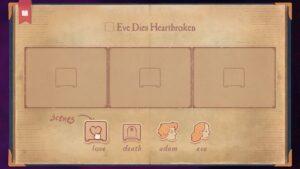
However, as I start trying to figure out the puzzle and dragging scenes and characters onto the grid, I find out that when I place Eve next to Adam’s grave, a broken heart appears above her head. At this moment, the game has clearly communicated to me that Eve is heartbroken and I now know to fully satisfy this prompt I simply have to put in a death scene for her.
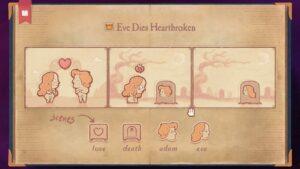
The game’s puzzles build on each other and always use the same icons and language to indicate what is expected of the player. This helped me to build and refine a comprehensive mental model of the game. While performing the loop of repeatedly solving puzzles, each individual puzzle the game threw at me constituted an arc within that loop. From each puzzle, I was able to add new terms and conditions associated with them to my model, making it very clear what the game wanted for me in each puzzle and how close I was to achieving that. I was never in a situation where I had no idea what to do for a puzzle for longer than a minute or two, ensuring I never became frustrated. For example, later on, I had another prompt dealing with heartbreak. I came up with the following incorrect solution.
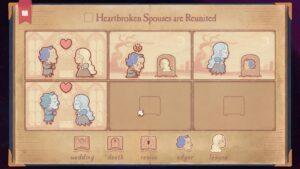
Because of the mental model the game had guided me to build with earlier puzzles, I was able to quickly realize the problem here was that Lenora never was heartbroken, since she never had a broken heart literally appear above her head.
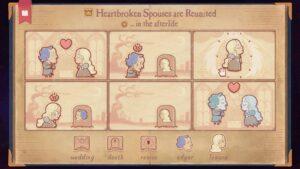
Another mechanic of the game that aids in abetting player frustration is that each story can have different solutions. There is not one exact configuration the player must input to be correct, as long as the general conditions of the prompt are satisfied. For example, in a puzzle such as the one shown below, there was no need to have specific people marry each other. The game did not force me to pair Edgar with Lenora or Bernard with Isobel to complete the prompt.
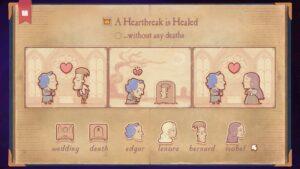
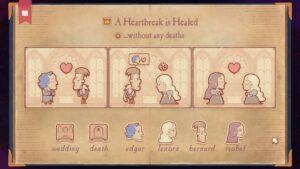
In addition, the game communicates to me at the moment of completion that for an extra challenge I can complete the puzzle without using the death scene. From later puzzles (such as “Heartbroken Spouses are Reunited” from earlier), I now know that if I had completed the puzzle without using the death scene first before even seeing that extra sentence, the game would have accepted that solution instantly and given me the extra point. This added flexibility in solving puzzles ensures that players don’t get frustrated by having to place specific people in specific places in scenes. If the game desires that, the developers made sure the prompt communicates that by adding names into the prompt. If it’s left ambiguous, the player is allowed to fill in the blanks as they desire. This ensures that no player ends up frustrated due to a lack of information or knowledge of a specific criteria or condition of the solution that they aren’t aware of.
Overall, in Storyteller, the mechanics help to clearly communicate the current state of the puzzle by giving feedback and allow flexibility and creativity when there is ambiguity in the puzzle. This ultimately results in fun derived from the challenge of figuring out the puzzles without any additional frustration or annoyance from unclear puzzle conditions.



